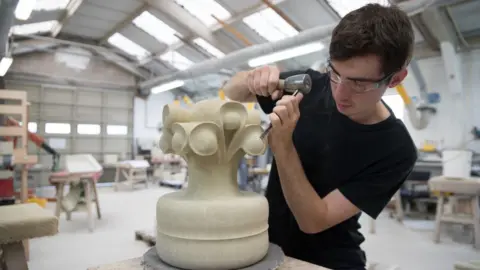Coronavirus: What support is there for my NI business?
 Pacemaker
PacemakerSince lockdown was first announced in March, a range of financial measures has been introduced to help individuals and businesses.
Some, such as the furlough scheme, are approaching an end date, while others have been announced following new restrictions.
These are some of the support schemes currently on offer, or coming into operation very soon.
Localised Restrictions Support Scheme
Under the new restrictions which began on 26 December, large parts of the economy had to close - only essential retail is allowed to stay open and hospitality businesses can operate on a takeaway basis.
Non-essential retail can only operate on a delivery basis, not a click-and-collect service while the "stay at home" order may cause concern for businesses that are allowed to stay open but rely on footfall, such as newsagents, pet shops, hardware shops, taxi drivers and dry cleaners.
The Localised Restrictions Support Scheme (LRSS) is for businesses that are forced to close because of government restrictions that have a premises or are a tenant in a premises.
Payments range from £800-1,600 for each week a business is closed.
If a business has previously applied, it does not need to re-apply and will automatically get a top-up for the six weeks starting from 26 December in a lump sum payment of between £4,800-£9,600.
What if I'm not eligible?
There is another scheme, this time run by the Economy Department, which might offer help.
The Covid Restrictions Business Support Scheme is for some not eligible for the LRSS.
The scheme is divided in two; Part A and Part B.
Part A is for businesses forced to close that don't have a premises, for example, driving instructors or hairdressers that rent a chair.
Eligible applicants are entitled to £600 per week they are closed in a payment that will be made in one lump sum.
If a business has previously applied, it does not need to re-apply, payments will be made automatically.
Part B is for businesses that are in the supply chain of those businesses forced to close because of restrictions and have seen a 40% reduction in turnover, for example, a food producer or a wedding photographer.
Grants of between £2,400-4,800 are available depending on the size of the business. Those who don't pay rates can get a grant of £1,800.
How about the self-employed?
There are two schemes available - one run by the UK government and one by the NI Executive.
The Self-Employment Income Support Scheme from the UK government allows people to claim a taxable grant. It has been extended to include a third grant covering the period from November 2020 to January 2021 and a fourth payment to cover February-April 2021.
The third grant will be 80% of average monthly profits in a single instalment, covering three months, capped at £7,500 in total. Details of the fourth grant have yet to be released.
You can apply even if you did not make a claim for the first or second grant earlier in the year.
Schemes for newly self-employed people and drink-only pubs have also been announced recently, although these payments don't specifically relate to this latest lockdown.
Newly self-employed people in Northern Ireland have fallen through the gaps in existing government support measures until now. They will be entitled to a one-off taxable grant of £3,500.
What other help is on offer?
The UK government will also give firms:
- £1,500 for every out-of-work 16-24 year-old given a ''high quality'' six-month work placement
- £2,000 for every under-25 apprentice taken on until the end of January, or £1,500 for over-25s
Rates relief saw hospitality, retail, leisure, tourism, childcare businesses and airports in Northern Ireland given a 12 month rates holiday last year that takes them up until 31 March 2021.
The executive has already set aside funding with a view to potentially extending this if needed later this year.
A reduced VAT rate of 5% for hospitality and accommodation is in place until 31 March 2021.
Pubs that don't serve food are entitled to between £800-1,600 per week for the 12 weeks they were closed between July and September last year. Applications for this scheme opened on 11 January.
Furlough
The furlough scheme, which was launched in March, was due to end on 31 October but Chancellor Rishi Sunak has extended it until the end of April 2021.
 Getty Images
Getty ImagesMr Sunak said the scheme will pay up to 80% of a person's wage up to £2,500 a month. He told the Commons that the government will review the policy in January.
It will apply throughout the UK.
As part of the revised scheme, anyone made redundant after 23 September can be rehired and put back on furlough.
The Job Support Scheme - a less generous form of support that had originally been set to replace the furlough scheme in November - has now been postponed.
What about apprentices?
 Getty Images
Getty ImagesBusinesses which have furloughed an apprentice are able to access incentive payments to bring that apprentice back and retain them until 31 March 2021.
The scheme pays £500 for every returned furloughed apprentice, payable for the first full month of paid apprenticeship from 1 November.
There is then another maximum of £2,000 available - £500 a month for up to four months of paid apprenticeship between 1 December and 31 March.
Another £1,200 is payable for successful full framework achievement of a returned furloughed apprentice.
The scheme is open to employers participating in the Department for the Economy-funded Apprenticeships NI or Higher Level Apprenticeship programmes.
